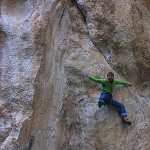Chamonix World Cup 2007UKC News, Jul 2010© IFSCThe first round of the 2010 lead climbing World Cup is set to start today, Monday the 12th of July, in Chamonix, France. No British competitors are entered in the event.Many people have been following the progress of the British Team in the Bouldering World Cup rounds, the latest of which was just held in Sheffield. The Brits are doing fantastically well in the bouldering competitions, but our international senior lead climbing team is almost non-existent. Our junior lead team is however very successful.The international big hitters are all competing, with Adam Ondra hotly tipped to take the title in the men's comp. Other well known competitors include the two Spanish climbers Patxi Usobiaga and Ramon Julian Puigblanque.In the women's comp several big names are entered such as Slovenian climbers Maja Vidmar and Natalija Gros and French climber Charlotte Durif. There is a live video stream of the event which is kicking off at lunch time today. You can watch the live stream here: 247.tvIs it time for a competition training wall in Northern England?Bouldering centres have been springing up all over the UK recently. They are relatively easy to build and house (big buildings are much more common that tall buildings) and are really fun to use. Many of these bouldering centres have large competition style walls.Lead walls that can cater for elite athletes training at the highest level are few and far between. The only international comp standard wall in the UK is Ratho, near Edinburgh.Robbie Phillips is a young Scottish climber who trains regularly at Ratho. He has witnessed the jump in performance of local climbers close to the wall.“Edinburgh International Climbing Arena is the biggest climbing wall in the world – it boasts one of the best international competition walls in the world, not to mention one of the steepest, and the local climbing scene has seen an incredible boost in both numbers and performance levels. Since Ratho opened its doors, the number of British Team members in Scotland has risen from 2 to 15…“ explained Robbie.Edinburgh is a 7.5 hour drive from London and a 5 hour drive from Sheffield/Manchester, meaning a day trip for training is almost out of the question for many of the UK's top climbers. Bouldering walls such as The Depot in Leeds, The Climbing Works in Sheffield and many other facilities offer high standard bouldering training facilities, but the local lead walls, whilst being of a very high quality and servicing the needs of thousands of climbers, often don't have walls long and steep enough to train specifically for international lead competitions.Rob Adie, Climbing Wall and Competition Officer at The BMC commented:“Northern England would be the ideal place to build a competition training wall. It would be central, and many of the team members are based in that area already. There have been a couple of attempts to get a wall up and running in Manchester, but they have failed for a couple of reasons. Manchester City Council wanted the wall to make a profit, and it isn't really very likely that a wall of this type could make a profit, although it could break even. Also, the proposed new wall was very close to an existing commercial climbing centre and we were worried it could have an impact on a current business.“Ratho is funded by Edinburgh City Council and doesn't turn a profit. In fact it has a long history of terrible financial trouble, but it is the kind of facility we need to provide a suitable training venue for our British Team.Steve Mayers of The Beacon Climbing Centre in North Wales is no stranger to building climbing walls and is currently in the middle of a large construction project in Milton Keynes. Steve gave us the low down on costs for a huge new wall:“We have just looked in to building a state of the art wall in Llanberis, from scratch, including a building. Our costs were about 2 or 3 million, so you could double or triple that for an international comp wall in Manchester.“ he said. „The best thing to do would be to get lots of different wall manufacturers involved to make sure you build the best wall possible. Finding an existing building would be the tricky thing. Maybe the Midlands would be a better area as there isn't as much commercial competition.“Wheels have been turning for several years, pushing climbing toward being an Olympic event. In February of this year the International Olympic Committee formally recognised the International Federation of Sport Climbing (IFSC), which is a major step toward climbing becoming an Olympic sport.“I think we will see climbing in the Olympics by 2020“ said Rob Adie of the BMC, „Or if not 2020, then definitely by 2024“.The three competition disciplines of Lead, Speed and Bouldering are being pushed forward and currently the Brits can only keep up in the Bouldering competitions. If we are not to be left completely behind, a training facility needs to be built.Anyone out there with several million pounds? Diesen Artikel inkl. Bilder auf UKClimbing.com anschauen
- Home
- News
- Videos
- Fotos
- Klettergebiete
- Unternehmen & Produkte
- Themen
- Themen beginnend mit 0-9
- Themen beginnend mit A
- Themen beginnend mit B
- Themen beginnend mit C
- Themen beginnend mit D
- Themen beginnend mit E
- Themen beginnend mit F
- Themen beginnend mit G
- Themen beginnend mit H
- Themen beginnend mit I
- Themen beginnend mit J
- Themen beginnend mit K
- Themen beginnend mit L
- Themen beginnend mit M
- Themen beginnend mit N
- Themen beginnend mit O
- Themen beginnend mit P
- Themen beginnend mit Q
- Themen beginnend mit R
- Themen beginnend mit S
- Themen beginnend mit T
- Themen beginnend mit U
- Themen beginnend mit V
- Themen beginnend mit W
- Themen beginnend mit X
- Themen beginnend mit Y
- Themen beginnend mit Z
- Routendatenbank
Climbing.de ist eine der ältesten deutschsprachigen Bergsportseiten im Internet.
Seit 1998 präsentiert Inhaber Martin Joisten, dessen Texte und Bilder in zahlreichen nationalen und internationalen Publikationen zu finden sind, aktuelle Informationen aus der Welt des Bergsports.
Seit 1998 präsentiert Inhaber Martin Joisten, dessen Texte und Bilder in zahlreichen nationalen und internationalen Publikationen zu finden sind, aktuelle Informationen aus der Welt des Bergsports.
Kontaktieren Sie uns: info@climbing.de
© Copyright 1998 - 2022 Climbing.de by Martin Joisten



![[VIDEO] Irmgard Braun: Record Breaking Rock Climber Who Gets Stronger Every Year Irmgard Braun: Record Breaking Rock Climber Who Gets Stronger Every Year (c) Hannah Morris Bouldering](https://www.climbing.de/wp-content/uploads/2025/11/youtube_MpAJEENfEjg-218x150.jpg)

![[VIDEO] The Challenge – Steve McClure The Challenge - Steve McClure (c) Petzl Sport](https://www.climbing.de/wp-content/uploads/2025/11/youtube_mfK9ynVsDvI-218x150.jpg)
![[VIDEO] Silence 9c/5.15d – The journey begins for Will Bosi Silence 9c/5.15d - The journey begins for Will Bosi (c) William Bosi](https://www.climbing.de/wp-content/uploads/2025/11/youtube_ujb7YRfE-7k-218x150.jpg)
![[VIDEO] Yosemite Crack Testpiece: Connor Herson on Magic Line Yosemite Crack Testpiece: Connor Herson on Magic Line (c) Fusis Films](https://www.climbing.de/wp-content/uploads/2025/10/youtube_h4GEt5iSZpA-218x150.jpg)
![[VIDEO] Hardest Trad Flash Ever | Adam Ondra | Lexicon E11 Hardest Trad Flash Ever | Adam Ondra | Lexicon E11 (c) Mammut](https://www.climbing.de/wp-content/uploads/2025/06/youtube_SAUyrDLG5xM-218x150.jpg)













